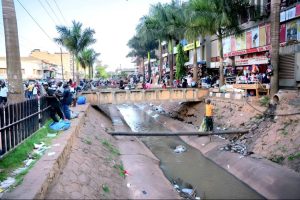The long-troubled Nakivubo Channel, once seen as Kampala’s greatest drainage nightmare, is undergoing a dramatic transformation.
Backed by businessman Dr. Hamis Kiggundu (Ham) in partnership with the Kampala Capital City Authority (KCCA), and guided by inspection teams from the Confederation of African Football (CAF) and CHAN, the project is turning what was once a flood-prone hazard into a landmark of green, sustainable urban design. 
Cutting through the heart of the city’s central business district, Nakivubo has for decades been a byword for pollution, danger, and flooding.
Now, ahead of Uganda’s hosting of the Africa Cup of Nations (AFCON) in 2027, it is set to become a showcase of resilience, beauty, and functionality.
CAF officials, after recent site visits, praised the progress made and underlined the importance of upgrading Nakivubo to meet international benchmarks.
Their recommendations have shaped the project, ensuring it delivers infrastructure that matches both environmental needs and global standards.
KCCA, which is supervising the technical aspects of the redevelopment, has hailed the initiative as a game-changer for Kampala.
“The collaboration between public institutions and private investors such as Hamis Kiggundu is exactly what Kampala needs to address long-standing urban challenges. This is not only about AFCON; it is about leaving a permanent legacy of safety, beauty and functionality for city residents,” said a KCCA official.
Ham, who is personally investing in the works, emphasized that the redevelopment carries a deeper meaning beyond the tournament.
“Nakivubo Channel has been a source of floods, insecurity and loss of life for too long. This redevelopment is about giving Kampala a clean, safe and modern urban drainage system. It’s a responsibility we owe our people, and a statement that Uganda is ready for the future,” he said.
When finished, the rejuvenated channel will include state-of-the-art flood-control chambers, waste filtration systems, pedestrian walkways, and landscaped green zones.
Instead of a scar dividing the city, Nakivubo will emerge as a vibrant corridor blending infrastructure with nature.
Observers have described the project as a landmark in homegrown development, powered not by external aid but by local investment and ambition.
The initiative is being celebrated as both a solution to Kampala’s persistent flooding problems and a symbol of Uganda’s readiness to host the continent’s biggest sporting event.